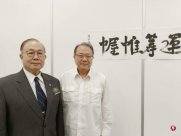Taiwan and legislators elections will appear on January 13, 2024.Taiwan's national security director Cai Mingyan said that mainland China is trying to use military, economic, diplomatic, cognitive operations and other means to affect the direction of the election.
According to Taiwan reports, Cai Mingyan attended the seminar on Wednesday (November 1) and delivered a speech.Compound threats, try to affect Taiwan's 2024 general election.The diversified penetration activities implemented by mainland China have set a peak in the past years, exacerbating safety challenges and threats.
Cai Mingyan said that in terms of political diplomacy, Beijing has continued to strengthen the "No. 1 Middle" pattern for international participation in Taiwan; in terms of military security, frequent use of sea and air force to deter Taiwan and conduct gray attack activities; economic and trade science and technology aspects;, Continuously intimidating political statements in Lu and Taiwan businessmen, increased the science and technology stealing of Taiwan -enterprise science and technology and talent digging; in terms of cross -strait exchanges, actively invited the grassroots at Taiwan and youths to expand the channels for the United Front of Taiwan;War selection "information such as" information such as "information such as" information such as voting, attacking key infrastructure in Taiwan, and consumer resources.
Cai Mingyan said that mainland China has long carried out a "smoke -free war" against Taiwan for a long time, and uses Taiwan as a pilot to test various composite threat tools to expand to other countries.The Taiwan government will continue to strengthen strategic communication and international cooperation with all parties to jointly maintain regional security and stability.In addition, Taiwan is expanding international industry cooperation, strengthening the toughness and economic security of supply chain, and strengthening the instant investigation mechanism and public media reading ability, and the threat of the cognitive war.



